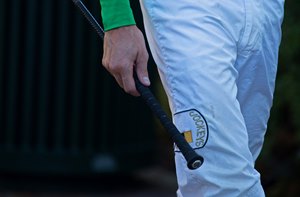Jockeys' Guild: Concerns Not Addressed in HISA Rules


The following is a statement from the Jockeys' Guild:
It is well-known that the Jockeys' Guild has long advocated for uniform rules governing horseracing and for heightened safety standards to protect the lives and health of its members. The Guild endorsed the creation of HISA and is not opposed to it now. Indeed, Guild Co-Chairman Johnny Velazquez has served on HISA's Safety Committee since May 5, 2021. The Guild does not harbor any ill-will toward any individual HISA officials.
The Guild availed itself of every opportunity, both prior to and during the notice-and-comment period on the proposed rules, to educate HISA and the FTC on the rules' impact on its members. To this end, the Guild supplied both bodies with thoughtful and detailed feedback. Unfortunately, in the version of the rules that went into effect on July 1, many of the Guild's concerns remained unaddressed. Also, to date, many of the Guild's questions remain unanswered. As currently written, the rules single out jockeys—the only "covered persons" whose lives are literally on the line in every race—without affording them the benefit of the enhanced safety protections they sought.
Faced with a July 1 date for implementation of the rules, the Guild's Board of Directors voted (with the exception of Co-Chairman Velazquez, who recused himself due to his ongoing participation on the Safety Committee) to honor the wishes of its membership and become a plaintiff in a federal lawsuit seeking to enjoin implementation of the rules.
Since joining the lawsuit, the Guild has taken heat from several organizations and individuals in the racing industry, and at times from the horseracing press. Everyone is entitled to their own opinion. Everyone is not entitled, however, to their own facts. Contrary to the representations of some, the Guild did not join the Louisiana lawsuit merely to bargain the number of times jockeys may use the riding crop.
Rather, the Guild joined the lawsuit to push HISA to modify its rules to address a number of concerns, all of which the Guild previously raised with HISA and/or the FTC and all of which are a matter of public record. Among those concerns were:
- HISA's elimination of the old requirement of having 1 certified paramedic trackside during training, and 2 certified paramedics trackside during racing. Just as the HISA rules require at least 2 operating equine ambulances, so should there be at least 2 operating human ambulances to safeguard the lives of jockeys. Elimination of the old requirement is absolutely unacceptable. It creates a potential for lack of medical care in the event of a multiple horse spill, which happens often. It is essential that the human ambulances be able to provide advanced life support and be fully and adequately staffed to respond to emergency situations.
- The lack of a centralized database to track jockey concussions, registration and annual physicals.
- The lack of guidelines as to when a jockey can return to racing following injuries other than concussions.
- The fact that the HISA rules penalize jockeys—and only jockeys—with a points system.
- A non-tiered system of unduly harsh fines and suspensions for jockeys that has a disproportionate impact on jockeys who race at lower-grossing tracks and that many jockeys cannot afford.
- The lack of a centralized database to track jockey penalty points assessed under the HISA rules.
- Permitting the use of only two models of riding crops, which were initially made by a single manufacturer, creating supply problems and selective enforcement.
- Disqualification of horses when jockeys exceed the permissible number of strikes, which at a major race like the Kentucky Derby could erode public confidence in the industry and will have a major impact on owners and breeders.
- Requiring continuing education for jockeys at every race meet, while other "covered persons" are required to undergo such training only on an annual basis. (Prior to July 1, and following months of conversations with HISA, HISA informed us that this requirement was changed.)
- Jockeys being required to waive their rights with respect to HISA's search and seizure rules.
- After July 1, inconsistences throughout the country in how the HISA rules are being interpreted and applied, leading to confusion and frustration not only among the jockeys, but also regulators, stewards, horsemen, owners and the betting public.
- After July 1, selective enforcement of the rules, including but not limited to the riding crop rules, and the selective enforcement of some rules against jockeys only. Picking and choosing which rules to enforce is fundamentally unfair and erodes HISA's stated goal of uniformity.
Those who have called for the Guild to withdraw from the lawsuit should ask themselves what the HISA rules as currently written are doing for jockeys and their safety. Those who have threatened adverse consequences against the Guild for its participation in the lawsuit should ask themselves how marginalization of jockeys' voices could possibly benefit the industry.
For its part, the Guild intends to move forward. HISA is not going anywhere, and the Guild intends to work with it as a partner. The Guild is and has always been willing to make reasonable compromises. If and when HISA ignores the Guild's legitimate concerns, the Guild reserves its rights, including its right to bring as a last resort a legal action as it has done in Louisiana. But where HISA shows itself willing to listen to the Guild's concerns and to address them, it will find no better friend than the Guild. That is how we move the industry forward.
